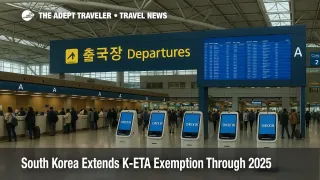South Korea Extends K-ETA Exemption Through 2025

South Korea will continue its temporary exemption from the Korean Electronic Travel Authorization, K-ETA, for certain nationalities through December 31, 2025. The Ministry of Justice confirmed the one-year extension to support tourism, and multiple official notices reiterate the end date in Korea Standard Time. Travelers should verify whether their passport is on the exempt list, and those who are not exempt should apply for K-ETA in advance at the official portal. Authorities also caution against unofficial application websites.
K-ETA is South Korea's pre-travel authorization system for short-stay, visa-free visitors. During the exemption window, nationals of specific countries, including the United States, the United Kingdom, Canada, Japan, Singapore, and several in the European Union, may enter without applying for K-ETA. The government has posted this policy via its overseas missions and the K-ETA notice board, which serve as the best sources of truth for the current exempt list. Because eligibility can differ by passport, and because postings are periodically updated, travelers should check the official K-ETA notices before purchasing tickets.
The exemption period runs from January 1, 2025 through December 31, 2025. As of the latest U.S. advisory update on August 11, 2025, K-ETA is expected to be required again starting January 1, 2026. If you are planning trips in early 2026, build time to recheck requirements in case authorities extend, revise, or replace the policy. For travel within 2025, the simplest rule is to confirm whether your passport is exempt today, then proceed accordingly.
Some exempt travelers still choose to apply for K-ETA. The advantage is procedural. Holders of a valid K-ETA can typically skip filling out an arrival card, which speeds the immigration process at busy gateways like Incheon International Airport, ICN. This is optional for those whose passports are on the exempt list, but it can be worth the minor effort if you value a tidier arrival workflow. Official tourism guidance highlights this convenience, and it aligns with how electronic travel authorizations function in many destinations.
Background, how K-ETA works
K-ETA is an online pre-clearance. Travelers submit passport details, trip information, and a fee via the official site, then receive an authorization tied to the passport. Airlines check for K-ETA, a visa, or exemption at check-in. For this temporary period, eligible nationalities do not need K-ETA for short stays, but everyone else must apply and be approved before boarding. Always use the official K-ETA portal, since governments routinely warn about copycat sites and agencies that charge extra or fail to deliver valid approvals. South Korean missions have issued such warnings this year, and the K-ETA site lists current notices and eligibility.
Traveler choices and timing
If your passport is on the exempt list, you can travel with a valid passport and no K-ETA through December 31, 2025. If your passport is not on that list, apply several days in advance on the official K-ETA site. If you are exempt but still want the arrival card benefit, you can file an optional K-ETA. For trips that cross the New Year, remember that authorities state K-ETA will be required beginning January 1, 2026, unless there is another extension. Check again before you fly, since border rules change.
Final thoughts
The K-ETA exemption simplifies 2025 travel to South Korea for many, but it is not universal. Your next step is simple. Confirm your passport's status on the official K-ETA notices, or apply if you are not exempt, then keep an eye on 2026 requirements. That way you avoid surprises at check-in, and you keep your arrival at Incheon moving.
Sources
- Notice on Extension of K-ETA Temporary Exemption (K-ETA official notice board)
- Notice on Extension of K-ETA Temporary Exemption, Ministry of Foreign Affairs, Republic of Korea, U.S. Mission
- Notice on Extension of K-ETA Temporary Exemption, MOFA, San Francisco
- South Korea, Travel Advisory, U.S. Department of State
- K-ETA Exemption Extended Through 2025, Korea Tourism Organization
